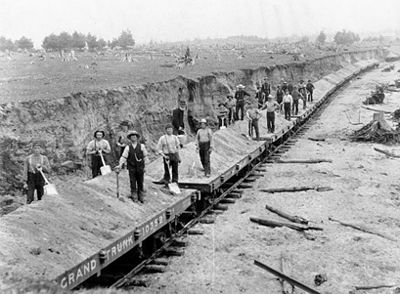Browse "Things"
-
Article
Economic and Regional Development Agreements
Economic and regional development agreements (ERDAs) refer to bilateral agreements between the federal government and each of the 10 provinces in effect from 1984 to 1994. The ERDA system was a major component of federal-regional economic policy over that period.
"https://development.thecanadianencyclopedia.ca/images/tce_placeholder.jpg?v=e9dca980c9bdb3aa11e832e7ea94f5d9" // resources/views/front/categories/view.blade.php
https://development.thecanadianencyclopedia.ca/images/tce_placeholder.jpg?v=e9dca980c9bdb3aa11e832e7ea94f5d9
-
Article
Canada–US Economic Relations
Economic relations between Canada and the US are of paramount importance to Canada.
"https://d2ttikhf7xbzbs.cloudfront.net/media/media/9da06892-ef18-4652-b682-3bb385411454.jpg" // resources/views/front/categories/view.blade.php
https://d2ttikhf7xbzbs.cloudfront.net/media/media/9da06892-ef18-4652-b682-3bb385411454.jpg
-
Article
Economic Council of Canada
The Economic Council of Canada was established 1963 and dissolved 1993.
"https://development.thecanadianencyclopedia.ca/images/tce_placeholder.jpg?v=e9dca980c9bdb3aa11e832e7ea94f5d9" // resources/views/front/categories/view.blade.php
https://development.thecanadianencyclopedia.ca/images/tce_placeholder.jpg?v=e9dca980c9bdb3aa11e832e7ea94f5d9
-
Article
Economic Forecasting
Economic forecasting is the projection or estimation of statistical measures of the performance of a country, group of countries, industry, firm or community.
"https://development.thecanadianencyclopedia.ca/images/tce_placeholder.jpg?v=e9dca980c9bdb3aa11e832e7ea94f5d9" // resources/views/front/categories/view.blade.php
https://development.thecanadianencyclopedia.ca/images/tce_placeholder.jpg?v=e9dca980c9bdb3aa11e832e7ea94f5d9
-
Article
Economic History of Canada
The economic history of what is now Canada begins with the hunting, farming and trading societies of the Indigenous peoples. Following the arrival of Europeans in the 16th century, the economy has undergone a series of seismic shifts, marked by the early Atlantic fishery, the transcontinental fur trade, then rapid urbanization, industrialization and technological change. Although different industries have come and gone, Canada’s reliance on natural resources — from fur to timber to minerals to oil, and on export markets for these commodities, particularly the United States — has underpinned much of the economy through the centuries and does so still in many regions today.
"https://d2ttikhf7xbzbs.cloudfront.net/media/media/30416a6f-5846-430d-9621-dbd0ce22e17e.jpg" // resources/views/front/categories/view.blade.php
https://d2ttikhf7xbzbs.cloudfront.net/media/media/30416a6f-5846-430d-9621-dbd0ce22e17e.jpg
-
Article
Economic History of Atlantic Canada
Nova Scotia, Prince Edward Island, New Brunswick and Newfoundland constitute the Atlantic provinces of Canada, a region that in 2016 accounted for 6 per cent of Canada’s gross domestic product (GDP). The economic history of what is now Atlantic Canada begins with the hunting, farming and trading societies of the Indigenous peoples. Following the arrival of Europeans in the 16th century, the economy has undergone a series of seismic shifts, marked by the early Atlantic fishery, the transcontinental fur trade, then rapid urbanization, industrialization and technological change.
"https://d2ttikhf7xbzbs.cloudfront.net/media/media/1c5bff08-0848-45ad-a132-880e22ac3515.jpg" // resources/views/front/categories/view.blade.php
https://d2ttikhf7xbzbs.cloudfront.net/media/media/1c5bff08-0848-45ad-a132-880e22ac3515.jpg
-
Article
Economic History of Central Canada
Ontario and Quebec constitute Central Canada, a region that accounts for over 58 per cent of Canada’s gross domestic product (GDP). The economic history of the region begins with the hunting, farming and trading societies of the Indigenous peoples. Following the arrival of Europeans in the 16th century, the economy has undergone a series of seismic shifts, marked by the transcontinental fur trade, then rapid urbanization, industrialization and technological change.
"https://d2ttikhf7xbzbs.cloudfront.net/media/media/2a01defb-42f2-4ad3-b7f1-cf7966378002.jpg" // resources/views/front/categories/view.blade.php
https://d2ttikhf7xbzbs.cloudfront.net/media/media/2a01defb-42f2-4ad3-b7f1-cf7966378002.jpg
-
Article
Economic History of Western Canada
Manitoba, Saskatchewan, Alberta and British Columbia constitute Western Canada, a region that accounts for 35 per cent of the Canada’s gross domestic product (GDP). The economic history of the region begins with the hunting, farming and trading societies of the Indigenous peoples. Following the arrival of Europeans in the 18th century, the economy has undergone a series of seismic shifts, marked by the transcontinental fur trade, then rapid urbanization, industrialization and technological change.
"https://d2ttikhf7xbzbs.cloudfront.net/media/media/804ad87a-c2a5-4d29-814e-542e786b1778.jpg" // resources/views/front/categories/view.blade.php
https://d2ttikhf7xbzbs.cloudfront.net/media/media/804ad87a-c2a5-4d29-814e-542e786b1778.jpg
-
Article
Economic Nationalism
Economic nationalism, in Canada, is a movement aimed at achieving greater control by Canadians of their own economy. In recent years it arose in response to the high degree of foreign (especially American) control of the Canadian economy.
"https://development.thecanadianencyclopedia.ca/images/tce_placeholder.jpg?v=e9dca980c9bdb3aa11e832e7ea94f5d9" // resources/views/front/categories/view.blade.php
https://development.thecanadianencyclopedia.ca/images/tce_placeholder.jpg?v=e9dca980c9bdb3aa11e832e7ea94f5d9
-
Article
Economic Regulation
Economic regulation, a form of government intervention designed to influence the behaviour of firms and individuals in the private sector.
"https://development.thecanadianencyclopedia.ca/images/tce_placeholder.jpg?v=e9dca980c9bdb3aa11e832e7ea94f5d9" // resources/views/front/categories/view.blade.php
https://development.thecanadianencyclopedia.ca/images/tce_placeholder.jpg?v=e9dca980c9bdb3aa11e832e7ea94f5d9
-
Article
Economics
Economics involves the study of 3 interrelated issues: the allocation of resources used for the satisfaction of human wants; the income distribution among individuals and groups; and the determination of the level of national output and employment. Economists investigate these issues either from the perspective of microeconomics, an analysis of the behaviour of the individual units in the national economy, including business firms, workers and consumers; or from the perspective of macroeconomics, the study of the larger aggregates in the economy, such as total investment and consumption, the average levels of interest rates and price indexes, and total employment and unemployment.
"https://d2ttikhf7xbzbs.cloudfront.net/media/media/fe9a7876-aee1-4ecb-865f-03fa3233f06e.jpg" // resources/views/front/categories/view.blade.php
https://d2ttikhf7xbzbs.cloudfront.net/media/media/fe9a7876-aee1-4ecb-865f-03fa3233f06e.jpg
-
Collection
Economics in Canada
Economics is a discipline that studies the production, distribution and consumption of goods and services. Economists study these issues from the perspective of macroeconomics or microeconomics. This collection brings together articles related to the history and study of economics in Canada.
"https://d2ttikhf7xbzbs.cloudfront.net/media/media/fe9a7876-aee1-4ecb-865f-03fa3233f06e.jpg" // resources/views/front/categories/view.blade.php
https://d2ttikhf7xbzbs.cloudfront.net/media/media/fe9a7876-aee1-4ecb-865f-03fa3233f06e.jpg
-
Article
Economy
Most modern economists think of ECONOMICS as the study of choice, so that, strictly, an "economy" consists of human beings - in this case Canadians - making choices, which obviously includes just about all of Canadian experience.
"https://d2ttikhf7xbzbs.cloudfront.net/media/media/6c86360c-8c9b-4d8a-ae51-39e98a17781a.jpg" // resources/views/front/categories/view.blade.php
https://d2ttikhf7xbzbs.cloudfront.net/media/media/6c86360c-8c9b-4d8a-ae51-39e98a17781a.jpg
-
Timelines
Economy and Labour
This timeline highlights moments related to economy and labour in Canadian history.
"https://d2ttikhf7xbzbs.cloudfront.net/media/media/31a8af13-f565-4f49-b305-2cee748f15db.jpg" // resources/views/front/categories/view.blade.php
https://d2ttikhf7xbzbs.cloudfront.net/media/media/31a8af13-f565-4f49-b305-2cee748f15db.jpg
-
Article
Ecosystem
A limited space within which living beings interact with nonliving matter at a high level of interdependence to form an environmental unit is called an ecosystem.
"https://d2ttikhf7xbzbs.cloudfront.net/media/media/a900e05f-6cab-483c-98fb-d602ef1a44bd.jpg" // resources/views/front/categories/view.blade.php
https://d2ttikhf7xbzbs.cloudfront.net/media/media/a900e05f-6cab-483c-98fb-d602ef1a44bd.jpg
